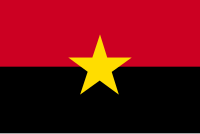People's Movement for the Liberation of Angola
People's Movement for the Liberation of Angola Movimento Popular de Libertação de Angola | |
|---|---|
| Abbreviation | MPLA |
| Chairman | João Lourenço |
| Secretary-General | Álvaro de Boavida Neto |
| Founder | Agostinho Neto, Viriato da Cruz |
| Founded | 10 December 1956 (64 years ago) |
| Headquarters | Luanda, Angola |
| Newspaper | Jornal de Angola |
| Paramilitary wing | People's Armed Forces for the Liberation of Angola |
| Ideology | Socialism, Marxism–Leninism, Populism |
| Political position | Centre-left to Far-left |
| International affiliation | Socialist International |
| Slogan | Peace, Work and Liberty |
| Party flag | |
 | |
| Website | |
| www | |
The People's Movement for the Liberation of Angola, also known as MPLA is a left-wing political party and a popular movement from Angola. The MPLA fought against the colonial Second Portuguese Republic (Estado Novo) in the Angolan War of Independence. The party has been the dominant party in Angola since the country's independence in 1975.
Conflicts[change | change source]
Angolan War of Independence
From 1961-1974, the Angolan War of Independence was fought by many parties, namely the MPLA, UNITA, FNLA, and FLEC.[source?] The MPLA fought alongside these parties for independence from Portuguese colonialism.[source?]
Angolan Civil War
From 1975-2002, the Angolan Civil War took place. The MPLA has been considered the ruling party of Angola since its victory of the Portuguese Colonial War.[source?] The war was started by the struggle for power amongst parties, where UNITA waged war with the MPLA, eventually resulting in Jonas Savimbi's death in 2002.[source?] This reduced the power of UNITA, leading to the signing of a peace treaty.[source?]
Foreign support[change | change source]
During both the Portuguese Colonial War and the Angolan Civil War, the MPLA received military, political and humanitarian support primarily from the governments of Algeria, Bulgaria East Germany,[1] Cape Verde, Czechoslovak,[2] the Congo, Cuba, Guinea-Bissau, Morocco, Mozambique, Nigeria, North Korea, Polish People's Republic, China, Romania, São Tomé and Príncipe, Somalia,[3] Soviet Union, Sudan,[2] Tanzania,[4] Libya[5] and SFR Yugoslavia. While China did briefly support the MPLA,[6] China also actively supported UNITA and Jonas Savimbi after Sino-Soviet split.
References[change | change source]
- ↑ Howe, Herbert M (2004). Ambiguous Order: Military Forces In African States. p. 81.
- ↑ 2.0 2.1 Wright, George (1997). The Destruction of a Nation: United States Policy Towards Angola Since 1945. pp. 9–10.
- ↑ Nzongola-Ntalaja, Georges; Immanuel Maurice Wallerstein (1986). The Crisis in Zaire. pp. 193–194.
- ↑ "Angola-Ascendancy of the MPLA". www.mongabay.com. Retrieved 2017-07-06.
- ↑ Gebril, Mahmoud (1988), Imagery and Ideology in U.S. Policy Toward Libya 1969–1982, p. 70
- ↑ China Study Centre (India) (1964). China Report. p. 25.
